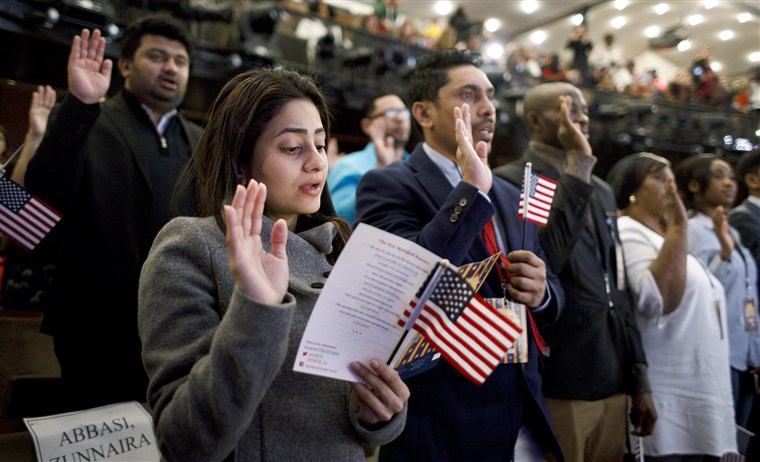Delaying Citizenship: Another Republican Vote Suppression Tactic

Barr and Miller and the other fascists have slowed citizenship applications way, way down. There’s little question that it is a big piece of the overall voter suppression tactics. Those hoping to vote this year for the first time are very upset about it.
Ten months ago, Laura Muñoz applied to become an American citizen so she could cast her first vote this fall in the country she calls home. For Muñoz, who moved to Miami from Colombia at age 12, the opportunity to vote felt like an auspicious way to mark a new decade.
But the 26-year-old hasn’t heard back about the next step in her naturalization process, even though she is in the final stages. With the early October voter registration deadline in Florida quickly approaching, she is no longer confident about her prospect of voting for the first time this year.
A backlog in naturalization applications at the U.S. Citizenship and Immigration Servicesis threatening to prevent an unknown number of immigrants like Muñoz from casting their first ballots this year. The delays have worsened amid budget shortfalls and policy changes by the Trump administration, as well as the coronavirus pandemic, which temporarily shuttered USCIS offices this year.
“I was really eager to cast my very first ballot this important electoral year, where there’s so much happening from local to national,” said Muñoz, who works at the Florida Immigrant Coalition, an immigrant advocacy group. “After you call this your country for so many years, you’re still not a part of its democracy. I speak for many people when I say that feels really hurtful.”
New citizens are a bigger part of the electorate than we might think. Five Thirty Eight has a rundown of this and how Republicans are slowing that way down.
Newly naturalized citizens are one of the fastest-growing voting groups in the United States. In February, the Pew Research Center published a report that found that 23.2 million naturalized citizens would be eligible to vote in November’s presidential elections, making up a record 10 percent of the total electorate. And according to a February analysis by the National Partnership for New Americans (NPNA), a coalition of immigrant advocacy organizations, 860,000 new Americans were expected to have naturalized by November before the pandemic brought things to a halt.
But not all eligible voters actually vote, and naturalized Americans have historically trailed native-born Americans at the polls.1 In 2016, for example, 54 percent of naturalized citizens voted in the general election compared with 62 percent of native-born citizens. According to studies, one explanation is an element that could be missing again this year: voter registration. It’s not a lack of desire to participate, the study finds, but rather it’s an unfamiliarity with how or where to register, registration deadlines, and language issues. Once these barriers are overcome and new Americans are registered, they tend to vote at the same rates as native-born members of their demographic group.
Take someone like Raz Ahmadi, a new U.S. citizen from Afghanistan. For the past five years, he has worked as an organizer registering voters and advocating for progressive environmental policies in Virginia. And this year, after completing the naturalization process, which had been interrupted by COVID-19, in mid-July, Ahmadi will finally be able to cast his own ballot.
Though he has already been involved in politics, Ahmadi says that being able to actually participate is a whole new feeling for him. Being “empowered to vote, mentally, it gives you a lot of power,” he says. “It just personalizes a lot of things. Now you’re more involved in the community.”
But even before COVID-19, the wait time for citizenship applications had hit new highs under the Trump administration. According to USCIS numbers, the naturalization process averaged 8.8 months in 2020, compared with 5.6 months in 2016 and a peak of 10.3 months in 2018,2 though in some cases, it could take up to three years.
COVID-19 exacerbated this delay. On March 18, USCIS temporarily shut down all public-facing activities, including interviews for visas, asylum and naturalization as well as oath ceremonies. The agency did not make plans for virtual alternatives, bringing much of U.S. immigration to a halt.
A natural disaster always is reflecting through inequities in American society. And those inequities are a result of power structures. Those in power are very likely to cynically use the natural disaster to reinforce those inequities. There’s no question that is what Barr and Miller and Trump are doing here. It’s just another data point in the nation’s march toward fascism.


